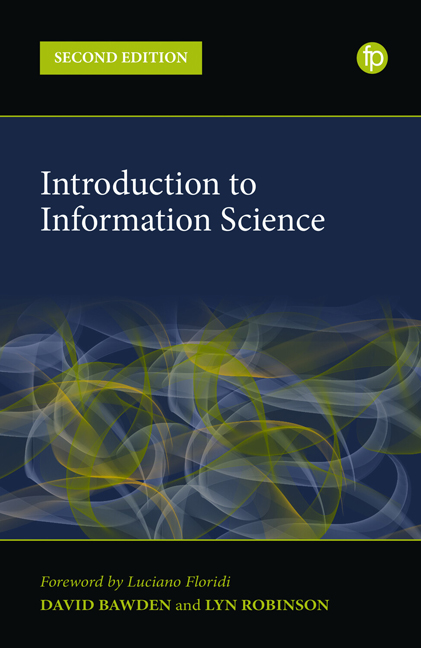Book contents
- Frontmatter
- Contents
- Figures
- Preface
- Foreword – Curators of Semantic Capital
- List of Acronyms
- 1 The Information Science Discipline
- 2 History of Information: the Story of Documents
- 3 Philosophies of Information
- 4 Paradigms, Turns and Theories in the Information Sciences
- 5 Information
- 6 Documents and Documentation
- 7 Domain Analysis
- 8 Information Organisation
- 9 Digital Technologies and Data Systems
- 10 Information Systems
- 11 Informetrics
- 12 Information Behaviour
- 13 Communicating Information: Changing Contexts
- 14 Information Management and Policy
- 15 Information Law and Ethics
- 16 Information Society
- 17 Digital (Onlife) Literacies
- 18 Research in the Information Sciences
- 19 The Future of the Information Sciences
- Additional Resources
- Index
14 - Information Management and Policy
Published online by Cambridge University Press: 21 April 2022
- Frontmatter
- Contents
- Figures
- Preface
- Foreword – Curators of Semantic Capital
- List of Acronyms
- 1 The Information Science Discipline
- 2 History of Information: the Story of Documents
- 3 Philosophies of Information
- 4 Paradigms, Turns and Theories in the Information Sciences
- 5 Information
- 6 Documents and Documentation
- 7 Domain Analysis
- 8 Information Organisation
- 9 Digital Technologies and Data Systems
- 10 Information Systems
- 11 Informetrics
- 12 Information Behaviour
- 13 Communicating Information: Changing Contexts
- 14 Information Management and Policy
- 15 Information Law and Ethics
- 16 Information Society
- 17 Digital (Onlife) Literacies
- 18 Research in the Information Sciences
- 19 The Future of the Information Sciences
- Additional Resources
- Index
Summary
Information policy is a dry and abstract term; it seems remote from everyday concerns and probably outside our control … But actually we experience information policy daily, and it affects our life styles, our political choices, our shopping, as well as other issues that we negotiate or navigate our way through, like health or education.
Ian Cornelius (2010, 3)Knowledge and wisdom, far from being one
Have oft-times no connection. Knowledge dwells
In heads replete with thoughts of other men
Wisdom in minds attentive to their own.
Knowledge is proud that he has learned so much,
Wisdom is humble that he knows no more.
William Cowper, The Winter Walk at Noon, Book 6 of The Task (1785)Introduction
Information management and policy is a multifaceted concept and can be understood in different ways. Sometimes it is understood as a wide and allembracing concept including records management, knowledge manage - ment, library management and so on, and sometimes with a much narrower focus. It ranges in scope from personal through institutional to national and international. It may or may not be taken to include general management processes of budgeting, managing people, etc. There is a close relation with IT management, since the great majority of information management (IM) uses digital systems; and a similarly close relation with the legal and regulatory framework for proper information use, the area of information governance. For overviews, see Detlor (2017), Schopflin and Walsh (2019), Evans and Price (2017) and Bystrom, Heinstrom and Ruthven (2019), and for general management issues, see Evans and Greenwell (2020). For insights into the historical development of IM, see Blair (2010), Black and Brunt (1999), Black, Muddiman and Plant (2007), Bawden & Robinson (2010) and Schopflin and Walsh (2019).
In this chapter we consider first some fundamental issues and models within IM and then some important contexts, including the management of collections, libraries, repositories, records, archives, documents, and knowledge. We then review information policies and strategies and ways of auditing and evaluation information services, ending with a brief consideration of some general management topics.
Information
- Type
- Chapter
- Information
- Introduction to Information Science , pp. 267 - 294Publisher: FacetPrint publication year: 2022
